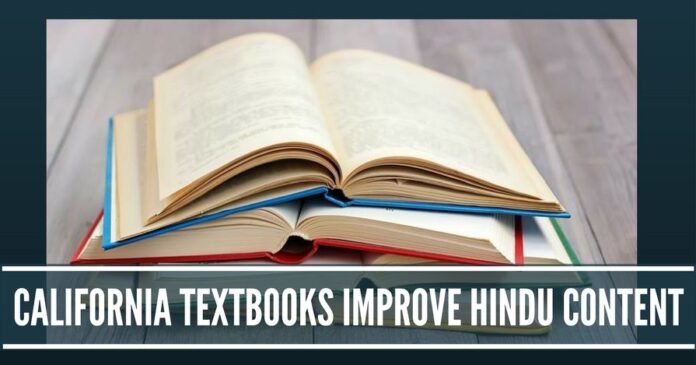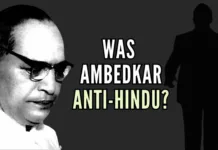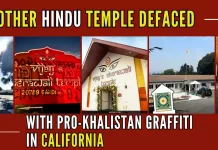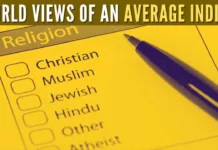
The California Department of Education took significant steps to suggest corrections and modifications
In a significant development for Hindu American families that have long agitated over the humiliating and demeaning portrayal of India and the Hindu tradition and faith in American school textbooks, the California Department of Education (CDE) on Thursday, 28 September 2017 recommended rejection of two academic programs submitted by the publisher Houghton Mifflin Harcourt (HMH), that has a significant market share for textbooks.
The Instructional Quality Commission is likely to send its recommendations to the State Board of Education (SBE) for approval soon. Once recommended by the board, the textbooks will be adopted by school districts starting early next year.
The term ‘program’ refers to a series of textbooks for different classes. HMH submitted two programs; the first had books for Std. K to 6 and the second had books for Std. 6 to 8, with an overlap for Grade 6. The two textbooks for Grade 6 were very different and the first series reflected very poorly on India and Hinduism. The California State Board of Education will take a final vote on this in November.
Should the vote go through, the California Department of Education would have paved the way for a more open and unbiased approach towards all discriminated groups. This would have a salutary effect on textbook publishers across all States in America.
For more than a decade, Hindu Americans have been agitating that textbooks demonized Hindus and Indians by promoting Orientalist narratives and including denigrating pictures of Hindu deities, slums, garbage, and poverty, to represent ancient Indian civilization and Hinduism. They suffered their most humiliating defeat in 2006 when Prof Michael Witzel and Steve Farmer intervened to manipulate the whole process of academic review by the California state board of education.
Even in the community panel assigned to review the new draft books, some members sided with the Leftist viewpoint and insisted upon the denigration of Hindus in the textbooks. Mercifully, these hate-filled voices were neutralized by the persistent efforts of Hindu schoolchildren who narrated before ICQ members their harassment and humiliation by non-Hindu classmates who were being taught Hindu-phobic matter from the impugned textbooks.
The Hindu groups are now hopeful that other publishers will adopt more balanced perspectives when preparing content on India and Hinduism for school children, who belong to all communities residing in America and get their first acquaintance with India and its traditions from their school curricula.
At the September meeting, the California Department of Education took significant steps to suggest corrections and modifications to the drafts submitted by publishers for the State’s History-Social Science textbook adoption and voted to reject content from two programs.
The development followed serious concerns raised by the Hindu American, LGBTQ, and African American communities regarding the biased and inequitable depiction of their communities in textbooks at the public hearing held by the CDE’s Instructional Quality Commission (IQC). The IQC conducts the textbook adoption process. Hundreds of Hindu Americans joined the LGBTQ and African Americans to seek fair, accurate and equitable portrayal for diverse communities in California.
In recent times, many lawmakers in California have written in support of the Hindus. In May 2016, nearly 55 reputed scholars of Hinduism in the United States sent a letter to the IQC supporting the grievances of the Hindu community; over two-thirds of these scholars were of non-Indian origin.
Gradually, Hindus succeeded in having the disparaging pictures removed and some positive amendments included. But many textbooks continued to convey extensive inaccuracies and stereotypes. More significantly, several items that are mandated in the California History-Social Science textbook framework (state guidelines) for India and Hinduism were willfully ignored by some publishers, a fact pointed out by the Hindu Education Foundation USA (HEF).
The community is still striving to obtain an accurate inclusion of Indian history, especially esoteric traditions like Yoga and Hindu philosophy, besides Sanskrit and Tamil Sangam literature, the Jain tradition, and the contributions of non-Brahmin, mainly scheduled caste (called Dalit in America) saints and sages.
The Hindu community galvanized thousands of parents, students, and community leaders for week-long protests across California in the last week of September, to demand accurate and equitable representation for India and Hinduism in textbooks. A petition signed by over 8,000 people demanding the withdrawal of biased and incorrect content was submitted to the Department of Education. The organizations that supported the struggle included Hindu American Foundation (HAF), Hindupedia, Bay Area Vaishnav Parivar (BAVP), Silicon Andhra, Bharati Tamil Sangam, Vedika Global and many other Indian American bodies.
Representatives from the Hindu Education Foundation USA and Hindupedia said that despite some changes, much more remains to be done in order to present India and Hinduism appropriately.
In early September 2017, a coalition of 25 highly respected academics from prestigious universities across the United States submitted a letter to the California Department of Education calling the textbook drafts “problematic” and urging the CDE to make qualitative changes to the textbook drafts to better reflect truth and cultural competency.
This time, the efforts of the Hindu American community were augmented by many public officials, including California Assembly member Kevin Kiley and the California State Asian Pacific Islander (API) Legislative Caucus led by Assembly member Ash Kalra. This came as a significant boost to the Hindu quest for justice and dignity in academia.
The Instructional Quality Commission is likely to send its recommendations to the State Board of Education (SBE) for approval soon. Once recommended by the board, the textbooks will be adopted by school districts starting early next year.
With the increasing number of reputed academics and public officials coming forward to speak up on this sensitive subject, the academic fashion of deriding and denigrating the Hindu tradition may find fewer backers in American academia. The major Hindu-baiters have fallen silent in recent years. In June 2017, when Prime Minister Narendra Modi visited the United States to meet President Donald Trump, the street protests by the usual suspects were remarkable for their absence.
More importantly, though this did not get the media attention it deserved, the leading American academics who revelled in overt and vituperative opposition to the Indian Prime Minister quietly retreated from their verbose penmanship into political invisibility.
Note:
1. The views expressed here are those of the author and do not necessarily represent or reflect the views of PGurus.
- Plagiarism with Pride - November 10, 2018
- “Hindu-ness is the essence of India” – RSS Sarsanghachalak - September 20, 2018
- Lacunas persist in Kathua story - May 5, 2018











Sandhya has done yeomen’s service by her through discussion of California textbook improvement initiatives. Hindus and Indians all across USA need to continue an unrelenting effort for our children to learn a more positive image of India and Hindu culture which Christian evangelist see as their greatest enemy.
Hindu groups across the US and particularly in California need to be congratulated on their unrelenting struggle. This is a significant success and will only snowball the awareness. Excellent piece
Good news indeed. Deeply disturbing the number of generations of children of Indian origin who have had to receive patronising and disparaging “education” about their heritage (“…denigrating pictures of Hindu deities, slums, garbage, and poverty, …”) and very little about the effects of outside “arrivals” into India, or even the rest of the world for that matter from these same “visitors”.
A laudable initiative of the Hindu community in California, which needs to be supported at all levels. I shall see if I could raise this issue with the Indian National Commission for Cooperation with UNESCO. Shall need some details. For that I seek your help, Sandhiya ji.
Even Karl Marx felt (he wrote thus in 1853)’ “Arabs, Turks, Moguls, who had successively overrun India, soon became Hindooised; the barbarian conquerors being, by an eternal law of history, conquered themselves by the superior civilization of their subjects” (New York Daily Tribune, Jun 25, 1853)
[…] https://www.pgurus.com/california-textbooks-improve-hindu-content/ […]